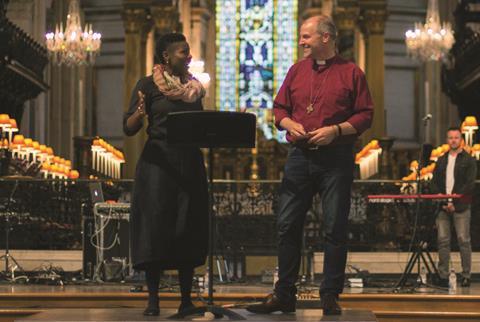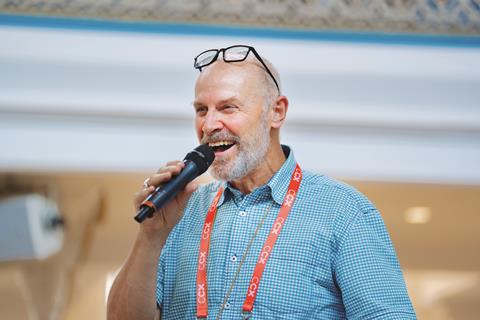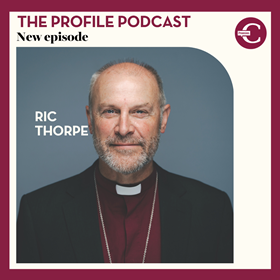The new Archbishop of Melbourne might be leaving the UK for warmer climes – but he is adamant that long-term decline in the Church of England is giving way to renewal
The Most Rev Dr Ric Thorpe has just become the first Church of England bishop to be installed as the Anglican Archbishop of Melbourne, Australia in nearly 70 years.
Formerly Bishop of Islington, Archbishop Ric brings to a diocese of six million people (a fifth of all Australians) significant experience in church revitalisation – as well as an infectious confidence that the long-term decline in Anglican church attendance is giving way to a new season of hope, vitality and growth. On this he is emphatic: in both England and Australia: “the Lord is preparing his Church for renewal and revival”.
As Archbishop Ric and his wife were packing their bags for warmer climes, he spoke to me about his bold approach to evangelism (often asking people “so why aren’t you a Christian?”) and his specialist subject: planting churches that flourish. We also discussed how Christians can seize the opportunities identified by Bible Society’s much discussed Quiet Revival report, which suggested church attendance in the UK is increasing, with young men in particular being drawn back to faith.
This year marks a decade since Archbishop Ric was recognised as the Church of England’s ‘bishop for church plants’ and founded CCX, the Gregory Centre for Church Multiplication, which has helped to support sustained growth in a number of new worshipping communities within the CofE. Many will be watching with interest to see how much of this success can be replicated down under.
Why are you moving from London to Melbourne?
The Diocese of Melbourne invited their members and churches to suggest names [for the new Archbishop of Melbourne], and I understand that my name came up because I’ve visited quite a few times in the last ten years doing ministry work there. They got in touch with me, saying: “Would you be interested in this role?” I talked to my wife, Louie, and we thought: “Well, Lord, if you’re in this, then you’ll open the doors. If you’re not, you’ll close the doors.”
There was a first interview online and then a second one in person, and then it went to an election of the synod, which is some 750 people. I was alongside three other people and had the wonderful privilege of praying with them a couple of times before the interviews.
Why do you think they elected you over a more local candidate?
I think they were looking for someone who had the kind of experience that I have: developing a vision and strategy, developing leaders, planting new churches and helping to revitalise old churches to impact the whole of Melbourne. When I saw the job description, my heart rose. There are some amazing people in the diocese and we all long to see something extraordinary happen.
Some would argue the quiet revival is just getting underway here in the UK, and we need your expertise in church planting and revitalisation more than ever. Why leave?
The Lord is doing something extraordinary in England. People have been praying for this. Churches are increasingly ready for this. I feel I am passing on the baton in a relay race. I had a meeting with a number of bishops who said they now want to take up that baton together, which will multiply the impact.
Like the Church of England, the Anglican Church of Australia has been in long-term decline – but there are signs of hope there also. When churches start revitalising and planting, they see growth happen across a range of different traditions. It feels as if the work that I have been doing here in England now needs to be done in Australia as well.
How do you think churches can most effectively respond to opportunities presented by the quiet revival?
Churches have to be ready for what God is doing, to be intentional, ready to invite, welcome and disciple new people. They need to offer courses, like Alpha and Christianity Explored, and have small groups, places to root them firmly in Christ.
Every church I know that has planted churches has grown itself. This is the mathematics of the kingdom; you can’t outgive God
Above all, they need to pray.Initiatives like 24-7 Prayer and Prayer for London have been doing this for a long time, but now there are churches and groups of Christians coming together in a new way. I’ve been part of a movement in east London where three churches, Saint Church, KXC and Imprint Church, come together every couple of months to pray. At the last one, there were 700 people in their 20s and 30s calling out to God to renew them, renew the Church and impact the nation. This desire for holiness has an evangelistic impact on others. God is giving the desire to pray, and he is then convicting our hearts to say: “I want to invite my friends, family and neighbours into this.” So, experience what other churches are doing; go and catch the fire. When I go to those prayer meetings, I am swept along in this atmosphere of prayer.
It takes time to build momentum, but you have to start somewhere. We encourage our church plants to build prayer into the diary, to have a moment midweek where you are praying for more of God. Do not worry about small numbers to start with. Build it over time. Invite the intercessors in your congregation and meet at times convenient to those you are trying to involve. Much also depends on the way meetings are structured and led. I have been to a lot of very boring prayer meetings and to a lot of very exciting ones!

How did you come to faith in Christ, and what have you learned from this about how to share Jesus with others?
My mum got converted at a Billy Graham rally in the 1950s, and Dad was in the Navy and felt compelled to faith in that context. I went to a boarding school where chapel was compulsory. I was a believer rather than a follower; I had not made a decision to follow Jesus.
When I went to university, a member of the Christian Union, Philippa Stroud (now Baroness Stroud) invited me to St John’s Harbourne in Birmingham. I must have heard the gospel hundreds of times before but on this occasion, the penny dropped. I had a picture in my mind’s eye of my school chapel. There was something in the middle of the chapel that was covered. All the things covering this thing up fell away and there was Jesus standing in the middle of the chapel! I realised the things that had stopped me seeing Jesus were the ways in which I had tried to explain the Christian faith away.
Jesus then said to me: “Ric, it is not about all those things. It is about me.” In my mind’s eye, he walked towards me and embraced me. The God who had felt so far away came close. When the invitation to follow Jesus came, I said: “Of course, I want to follow you.” The need to ask people to make a decision, to take a step, has stayed with me.
I was discipled by someone who read the Bible with me every day, often at 7am. We went through the book of 1 John, asking questions. This man, Kevin, taught me how to pray, read the Bible and apply scripture to my daily life. Then Philippa introduced me to the person who led her to Christ, Louie, who I’m now married to.
J.John, the evangelist, was doing a mission at our university and invited me to work for him. I became his driver and bag carrier. Then he asked me to organise some of his missions. I went to Australia with J.John and his wife, Killy, then visited Philippa in Hong Kong, where she was doing some work with Jackie Pullinger [founder of the St Stephen’s Society, a Christian drug rehabilitation project]. It had a great impact on me, seeing drug addicts and Triad gang leaders being healed miraculously, coming to faith in Christ and being discipled.
The need to ask people to make a decision, to take a step, has stayed with me
After graduating, I started work at Unilever. During my first week, we were asked to give a presentation on anything we liked, so I shared what I had seen in Hong Kong. Many people came up to me afterwards saying: “Can you tell me more?” So, whenever you enter a new environment, make it clear you are a Christian in a way that invites people in.
When someone gives you the opportunity to talk about Jesus, what do you say?
Let me give you an example. A man called David was very close to someone in our congregation. She said to him: “I would love to marry you, but I want to marry a Christian.” He came to me and said: “What am I supposed to do?” I asked David: “What’s stopping you from becoming a Christian?” and he replied: “Nobody has ever asked me that before!”
I explained that Jesus came into the world to break down the barrier between us and God caused by the things we do wrong; to take those sins, when we confess them, on his own shoulders, dying on the cross, then being raised from the dead by the power of God so we can have a personal relationship with him. I then asked David: “Would you like to start that relationship with Jesus now?” and led him in prayer.
I have gently challenged a number of people in this way over the years. In almost every case, they have ended up saying: “Yes, I would like to start a relationship with Jesus.”

How did your ministry in church planting begin?
I got more and more involved in the life of my church, Holy Trinity Brompton (HTB) in London, leading worship, leading home groups and then planting home groups. After three or four years, I went forward for ordination, married Louie and came back to HTB as a curate. The Bishop of London asked Rev Sandy Millar [then leader of HTB] to plant a church in east London, and he asked Louie and I to lead it. It took us a little bit of time to realise that God was calling us to this, because it was the last place we were expecting to go, but we felt God ask us to not mind any discomfort, unknowns or fears, to place our hopes in him and to go.
The Lord is doing something extraordinary in England
We had the most extraordinary ten or so years at St Paul’s Shadwell. The church only had twelve people when we arrived, and they were going to close it. Our home group came with us – they moved house, and we were joined by other HTB people living in the East End. The church began to grow by the grace of God, and we then had the chance to revitalise four other churches in Tower Hamlets. The Bishop of London, Richard Charters, said: “I want you to be a bishop, to do this kind of work around London and nationally.”
What do you say to church leaders who fear that sending a team to plant a church elsewhere will leave them short of people and money?
I would start with the Great Commission. Jesus doesn’t want us to stay in a holy huddle, but to go and make disciples. We’re called to be generous with the gospel, to take it out to other places. We need to reach the unreached. Why should they cross all these boundaries to come to us? We need to go to them.
That said, every church I know that has planted churches has grown itself. This is the mathematics of the kingdom; you can’t outgive God. To see the fruit of church planting is the most extraordinary blessing: seeing people come to faith, seeing churches come back to life, seeing new churches start. Even church plants that only last a few years and then stop – for those few years, they will have had a positive impact.
To hear the full interview, listen to Premier Christian Radio at 8pm on Saturday 13 December or download ‘The Profile’ podcast premierchristianity.com/theprofile





































1 Reader's comment